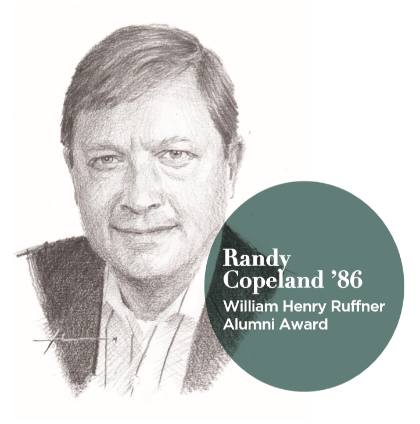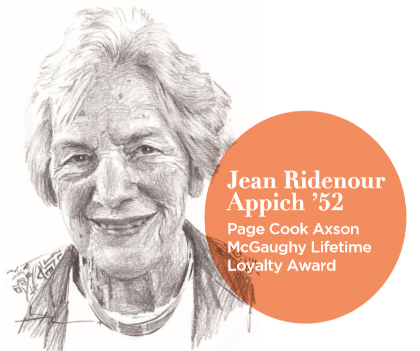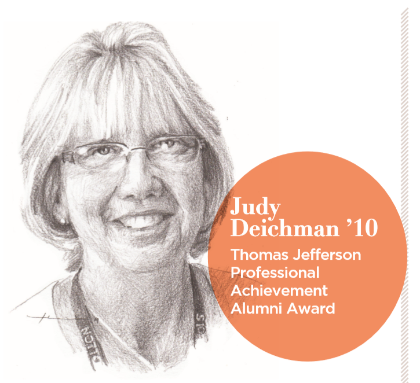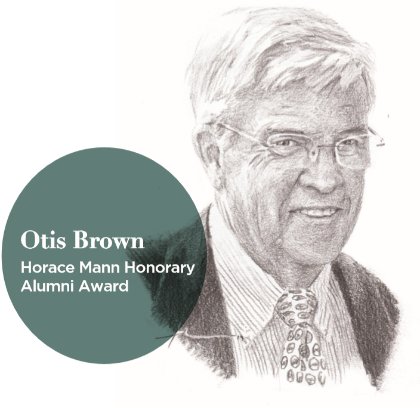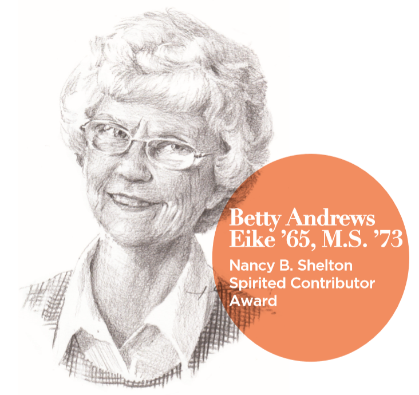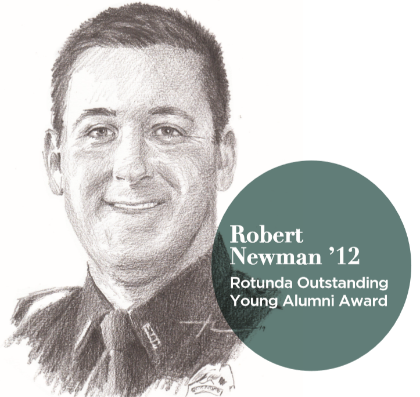
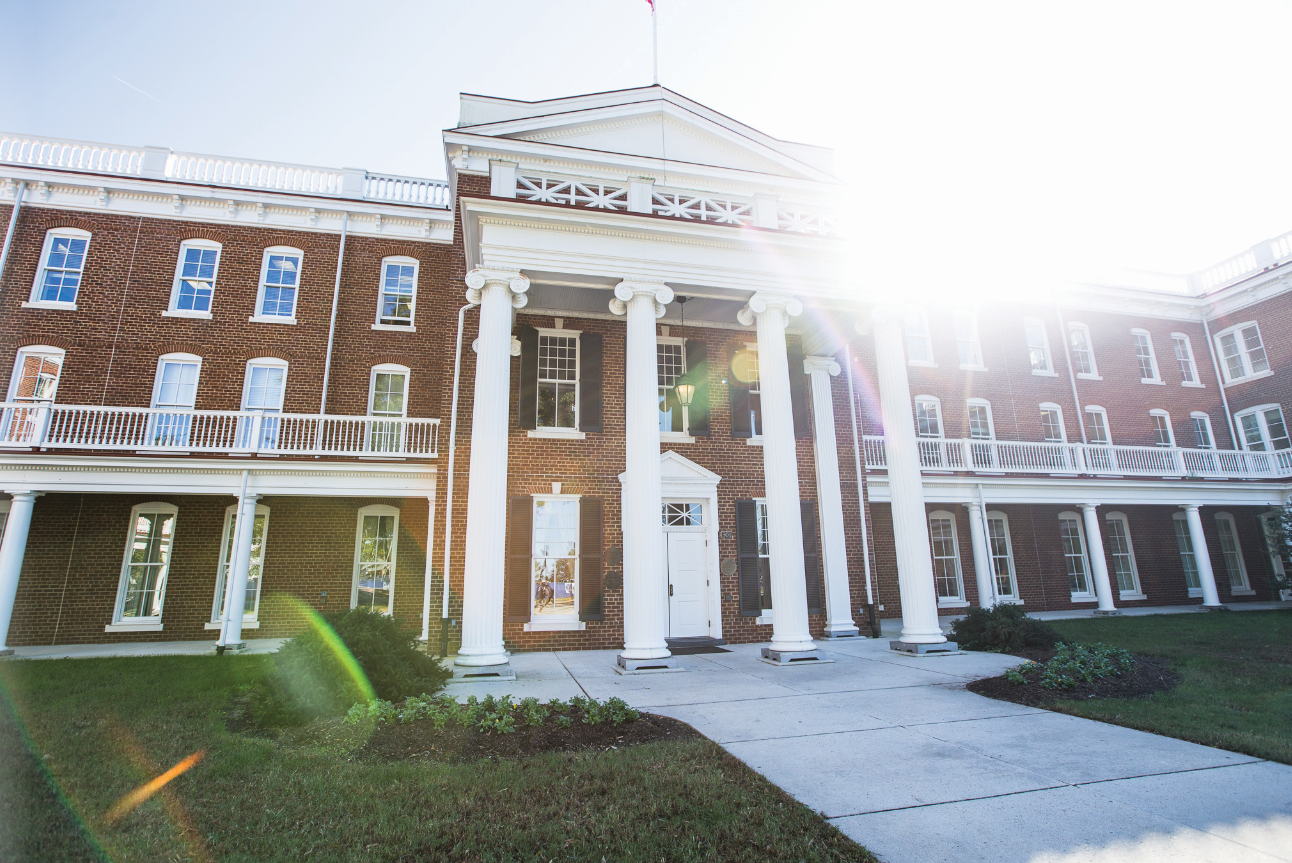
Surprised, but honored. That sums up how this year’s six deserving recipients felt on learning they had been recognized in Longwood’s annual Alumni Awards program. Together they have logged years of effort, service and invention, all working hard to add value to their communities. Additionally, they are uniquely connected by their love for Longwood University.
They range from a law enforcement officer to a librarian, and all have benefited from and significantly contributed to the university. Earlier this month, they joined the impressive roster of alumni and allies of the university who have been singled out for their dedication, professional success and big-heartedness since the awards program began in 1970.
“I’ve always liked to try new things,” said Randy Copeland, CEO of Velocity Micro, a privately held boutique computer manufacturer located in Richmond. “Those experiences have given me the skills to sink or swim. Fortunately, I’ve usually been able to swim.” Speaking of sink or swim, Copeland had never been to the campus when he arrived to start classes at Longwood. His father’s plan was that he would major in biology and then go on to dental school. But when Copeland got a C in Organic Chemistry, he was advised to change his major to business. That’s when things began to click.
“I became excited about my business classes, made friends and, in my sophomore year, met my wife.” After graduating, he went to work for his father, whose company manufactured plumbing products. Copeland started at the bottom, dragging heavy sacks of marble dust across the warehouse, but it wasn’t long until he rose to the position of salesman—the company’s first. On the side, he built and sold computers, an interest that would explode into a lucrative, gratifying business.
His original plan for Velocity Micro was to build CAD workstation systems for the kitchen/bath design industry. The company soon took off, earning an Editors’ Choice award from prestigious PC Magazine for its high-end PCs and workstations. Velocity Micro’s product line also includes Android tablets, external optical drives and monitors. Customers include retailers like Best Buy and Amazon as well as corporations, universities and government agencies.
In 2010, Copeland was invited to be a Longwood Entrepreneur in Residence. He shared his business philosophy—“I think being ethical is the best way to be more profitable”—mentoring business students and speaking to both large and small groups on subjects such as international business, marketing and business ethics.
His own college experience 20 years past, Copeland found the students weren’t that different.
“I noticed students were engaged in varying degrees. Some were very excited. They reminded me of myself in those days. Others not so much. You get out of school what you want. For me, that was a lot."
When Jean Ridenour Appich ’52 learned she was receiving an award, she thought a mistake had been made: “Certainly there must be people who’ve done more than me?”
But in conversation, she reveals a long history of service: For decades she helped organize class reunions every five years and alumni activities in between. She served on Longwood’s Foundation Board and on the Alumni Board as president. And then there were the fundraising and development efforts. But it all seemed more like fun than work, she said.
As a high-school senior, Appich already knew that she wanted to teach physical education at the middle-school level in Richmond. She heard about Longwood’s reputation for job placement and applied.
“Two other girls and I lived on the second floor of Main building [now Ruffner Hall]. Our central location guaranteed lots of company,” she said. From the start, she loved the physical education program, which taught her everything from coaching skills to modern dance.
Shortly after graduating, Appich was married and moved to El Paso, Texas, where her husband was stationed at Fort Bliss. She didn’t stay long, however, returning that September to Virginia, where she went straight to work teaching physical education to seventh- and eighth-grade girls in Richmond.
The experience was a joy, but after two years she became pregnant with the first of her three children and had to stop working. “In those days a woman couldn’t teach past her fourth or fifth month,” she said. “I really missed it.” Over the years Appich volunteered with numerous organizations in Richmond, including the YWCA, where she helped with swimming and other exercise programs. She also was an elder in her church.
Appich, who lives at Westminster Canterbury in Richmond, says she doesn’t get around as much these days. “But I was able to make my 65year reunion. About 15 or 16 of us showed up, along with three husbands. We thought we were right cute,” she added with a chuckle.
In the summer of 2015, Nottoway Middle School librarian Judy Deichman noticed that, even though the library was open, “the kids I really needed to reach weren’t coming.” She reasoned that the students may not have had a way to get to the library, which is located in Crewe, a rural area without public transportation.
Her solution: take the books to the students.
That same summer, she got a grant to pay for the books, but the county didn’t appropriate funds for a vehicle. Undaunted, Deichman went in search of wheels. A local preschool owner near her home in Chesterfield donated a 27-year-old small bus soon after. With help from school employees and parents, Deichman retrofitted it with bookshelves, signage and a P.A. system so music could announce its approach just like an ice cream truck.
When she climbed behind the wheel for the Nottoway Book-A-Way Summer Bookmobile’s maiden voyage in the summer of 2016, she learned that un-air-conditioned buses can be stiflingly hot. She pressed on, delivering books Monday through Thursday. The following summer, she added federal lunches for about 65 eligible students on her route.
“They’re glad to see the bus coming. It’s an important part of their day,” Deichman said.
And it’s just as important to Deichman—a realization she made one day when she was volunteering in the library where her five children attended school. “I thought to myself, ‘I love this. Libraries are where I’m meant to be.’”
She enrolled in Longwood’s librarianship program, a mix of online and face-to-face classes helmed by a pair of enthusiastic and accommodating professors. Two years later she had earned a Master of Education in school librarianship and found a position where she could make a difference.
Deichman, who received the 2018 American Association of School Librarians’ (AASL) Innovative Reading Grant, would like to see more bookmobiles on the road.
“It’s vital to prevent summer slide, especially for kids who’d otherwise have no access to the library during summer months.”
Otis Brown likes to say that “Longwood is not out chasing other institutions’ rabbits. The university does what it can and does it right.” Though not an alumnus, Brown undeniably has played a role in shaping Longwood into what it is today.
He led the formation of the Longwood Real Estate Foundation, which, using the public/private partnership plan and bolstered by his leadership, allowed the university to expand off-campus, university-managed housing for students in both Lancer Park and Longwood Landings.
“A large part of the Real Estate Foundation’s early success was due directly to our excellent board members,” said Brown. “They had a good grasp of what the foundation should and should not do. If it didn’t make sense financially, then we didn’t do it.”
Brown served on the Board of Visitors from 2003-11, including a term as vice rector. And he was a member of the visionary committee that recognized the potential of Hull Springs Farm, a 662-acre property bequeathed to the university that is situated between two tributaries to the Potomac River and just a short distance from the Chesapeake Bay. Today Hull Springs Farm is a living, breathing outdoor classroom for budding scientists, archaeologists and conservationists—and more developments are on the horizon.
Brown’s connection with Longwood began while he was an undergraduate at the University of Richmond. “My wife is an alumna of Longwood, or Longwood College as it was known in those days. When we were dating, I’d drive out to Farmville to see her.” Over the years, his attachment to Longwood has only increased.
Gov. Mark Warner initially asked Brown to serve on the Longwood Board of Visitors. “Four years later, then-Gov. Tim Kaine asked me to continue, so I was involved as more than a casual person,” said Brown, a longtime Chesterfield resident.
He spent much of his career in public service to the commonwealth. In 1966, when he was just 32, he was appointed director of the Virginia Department of Corrections and Welfare. From 1972-77, he served as Virginia’s secretary of health and human resources. Following that, he consulted until 1989, when he took over the State Fair of Virginia and served as president for 15 years.
Officially a cataloging specialist in Longwood’s Greenwood Library, Betty Andrews Eike unofficially doubles as an in-house historian. When co-workers from Special Collections and Archives need someone to identify people or places in old photographs, they go to Eike. Occasionally she remembers the face and not the name, but often she nails it.
Her knowledge is impressive but not surprising. After all, Eike has worked at the library for 50 years, and her campus association goes back even further. Most of her family either worked or graduated from Longwood. Eike, a lifelong Farmville-area resident, arrived at Longwood as an undergraduate in 1961, and, with the exception of two years when she taught in public school, she was on campus earning degrees and then working at the library.
In the 1970s, Eike rode her Honda motorcycle to work. Since then, she and the library have changed.
“When I started, we used the old card catalog. Now we have an electronic library system. The changes are vast and have been amazing to see. Today I catalog everything from traditional print material to multimedia and electronic resources like streaming videos and e-books,” she said.
Eike remembers when the library moved to its present location in 1991. “That was hard work but terrifically exciting. Administrators, faculty members, staff and students helped reshelve books in the new building.”
Despite the changes, Eike’s devotion to Longwood remains steadfast. The library is where she feels most effective and engaged. Eike has lost her husband, Gene, a well-known broadcaster in Farmville, and her immediate family. Now the library is her home, she said. “That’s one reason I’ve stayed so long. You just don’t give up on your family.
“Probably one day I’ll keel over in the library, be stamped ‘discard,’ and rolled out with the other discards,” she joked. Until then you’ll know where to find her.
For Officer Robert “Robby” Newman, a Roanoke city police officer and U.S. marshal carrying out high-risk warrants, each workday is different, but there are similarities: “You’re dealing with a lot of people—some new and some you’ve seen before—who are experiencing what’s often a crisis in their life. You have to be there to help them figure it out.”
Community policing is part of the job, he said. “We’re encouraged to interact with people in our area. This includes after-school homework programs and events for organizations like Big Brothers and Big Sisters. It fosters a positive relationship.”
In addition to dealing with the public, Newman also helps in training new police officers and is a member of the tactical response team. Future goals include becoming a task force officer with the U.S. Marshals and later getting into command staff. “I never want to get too far from the streets. It may change here and there as circumstances change. That’s something I’ll re-evaluate as it comes.”
He decided to pursue a career in law enforcement in his sophomore year at Longwood. It seemed a familiar and viable professional trajectory, he said. “It’s really interesting to take what you’ve studied at university and apply it to real life. Sociology taught me a lot about people. And from criminology, I learned a lot about case law and the details of our justice system.
“But relationships are without a doubt the biggest thing I took away from Longwood, personally and professionally,” he said.
He met his wife, Brooke, during their freshman year at Longwood. And as an outfielder on Longwood’s baseball team, he shared a unique relationship while living, studying and playing with his teammates. Today, he counts these Lancers among his closest friends.
“When I first graduated from the Police Academy, I was most interested in high-speed chases,” Newman said. “Today I consider intervening in young people’s lives and making a positive impression on them equally as important.”
About the Author
PATRICK FOLLIARD
ILLUSTRATIONS BY MIKE THEUER
